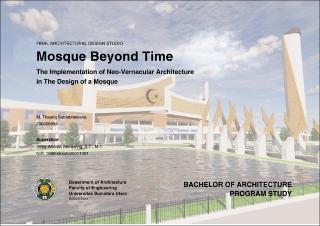Mosque Beyond Time The Implementation of Neo-Vernacular Architecture in the Design of a Mosque

Date
2024Author
Satriabhawana, M Thaariq
Advisor(s)
Sembiring, Dicky Andrea
Metadata
Show full item recordAbstract
This comprehensive research delves into the nuanced application of neo-vernacular architecture in the design process of a mosque
situated in Medan City. Neo-vernacular architecture, characterized by its fusion of traditional design elements with contemporary
aesthetics, offers a distinctive framework for mosque design that seeks to harmonize cultural heritage and modern design sensibilities.
This study investigates the contextual relevance and feasibility of incorporating neo-vernacular principles within the unique urban
landscape of Medan. The research methodology encompasses a multifaceted approach, integrating architectural analysis, cultural
studies, and urban planning considerations. By examining historical precedents, traditional architectural motifs, and contemporary design
trends, the study aims to identify opportunities for innovation while respecting the rich cultural tapestry of Medan. The research explores
the potential impact of neo-vernacular design on the functionality, aesthetics, and cultural identity of the proposed mosque. Through an
in-depth analysis of the urban context, the study addresses the challenges and opportunities presented by Medan City, considering
factors such as spatial constraints, cultural diversity, and community engagement. The findings aim to provide valuable insights for
architects, urban planners, and stakeholders involved in the development of mosque architecture, particularly in urban environments with
diverse cultural contexts
Collections
- Profession of Architect [205]
